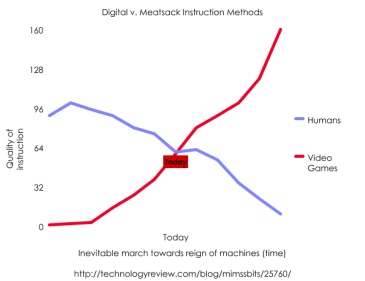Should Math Education Be Replaced by Video Games?
Some aspects of education – especially mathematics, which requires repetitive practice – seem like they could easily be adapted to the video game format, where players are encouraged to play over and over again until they master new skills.

A study of the effectiveness of one video game designed to teach linear algebra, called DimensionM, revealed a significant difference between a control group, who received traditional mathematical instruction, and a treatment group, who played the DimensionM game.
Owing perhaps to the limited statistical power of their study (which included about 200 kids), the researchers don’t make any attempt to quantify the difference that the game made, other than to say that the students who played it in school did better. Past studies have revealed mixed results for the use of games in the classroom, but the authors argue that this is precisely the point – any game that’s to be used in school should be evaluated in a controlled study first.
In terms of the larger implications for education, it’s worth noting that this school district, which was somewhere in the Southeast U.S., was relatively low-achieving to begin with. So arguably the study’s results are more likely to generalize to similar districts. In fact, a growing body of educators are already arguing that the world’s worst-off children are better off being educated by machines.
Educational games have come a long way since the Cave of the Word Wizard and Dungeon of the Algebra Dragon, and DimensionM typifies the changes that have taken place. Not only does it take place in a three-dimensional world, but it’s also multiplayer, tapping into kids’ natural inclinations to both compete and cooperate.
Given the level of math phobia present in American schoolchildren and the sorry state of financing for education, it’s worth asking whether or not the trend lines of declining quality in education and increasing quality of educational games have already crossed for a significant portion of American students.
Here’s a graph I just made up right now to illustrate my hypothesis. No doubt it will be showing up in authoritative reports sometime soon, after its origins have been scrubbed by the Internet.


Keep Reading
Most Popular
Large language models can do jaw-dropping things. But nobody knows exactly why.
And that's a problem. Figuring it out is one of the biggest scientific puzzles of our time and a crucial step towards controlling more powerful future models.
The problem with plug-in hybrids? Their drivers.
Plug-in hybrids are often sold as a transition to EVs, but new data from Europe shows we’re still underestimating the emissions they produce.
Google DeepMind’s new generative model makes Super Mario–like games from scratch
Genie learns how to control games by watching hours and hours of video. It could help train next-gen robots too.
How scientists traced a mysterious covid case back to six toilets
When wastewater surveillance turns into a hunt for a single infected individual, the ethics get tricky.
Stay connected
Get the latest updates from
MIT Technology Review
Discover special offers, top stories, upcoming events, and more.